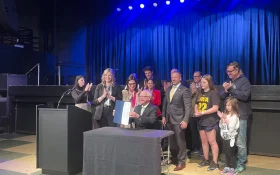Minnesota Governor Tim Walz signed into law a new bill aimed at providing more transparency and protection for people purchasing tickets online for concerts, sporting events, and other live events in the state.
The legislation, dubbed the “Taylor Swift bill” and officially known as House File 1989 (a reference to Swift’s album title), was prompted by the frustration experienced by a legislator who was unable to buy tickets to Swift’s 2023 concert in Minneapolis.
Under the new law, ticket sellers will be required to disclose all fees upfront and will be prohibited from selling more than one copy of a ticket. These measures will apply to tickets purchased in Minnesota or other states for events held in Minnesota. Supporters of the legislation say that Minnesota joins Maryland as one of the few states to pass such protections for ticket buyers into law.
The bill signing took place at First Avenue, a popular concert venue in downtown Minneapolis, with Governor Walz emphasizing that the new law will provide protection against fraudulent tickets and prevent resellers from buying up all the tickets before consumers have a chance to purchase them.
The law’s chief author, Democratic Rep. Kelly Moller, was among the thousands of people who experienced difficulties with Ticketmaster’s system during the high-demand sale of Taylor Swift concert tickets in 2022. The system crashed due to the overwhelming demand and attacks from bots attempting to purchase tickets for resale at inflated prices. While the situation led to congressional hearings, no federal legislation has been passed to address the issue.
Mike Dean, a father who testified in support of the bill, shared his experience of attempting to purchase tickets for his daughter to see basketball star Caitlin Clark.
Despite an initial expected cost of $300, hidden fees caused the final price to exceed $500, leaving him with little time to make an informed decision.
The new law, which takes effect on January 1, 2025, and applies to tickets sold on or after that date, aims to bring much-needed transparency to the ticket-buying process and protect consumers from deceptive practices.
The Associated Press contributed to this article.
